Transnational Project Meetings
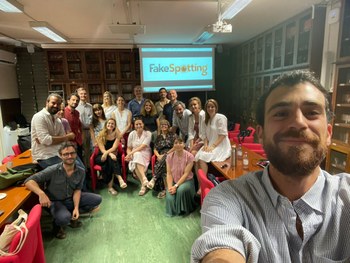
The fifth and final meeting in Bologna - hosted by the Coordinator University of Bologna - provided the opportunity to check the finalisation of the Outputs, collect the feedbacks from the Multiplier Events around Europe and celebrate the final event together. The meeting has been attended by the all the participant organisations. A final check has been conducted on administrative documentation, timesheets, job contracts, dissemination reports, dissemination tools, outputs and executive summaries local translations, multiplier events documentation, trainings and meetings documentation.
All the participants received an attendance certificates and evaluated the meeting though related questionnaire.
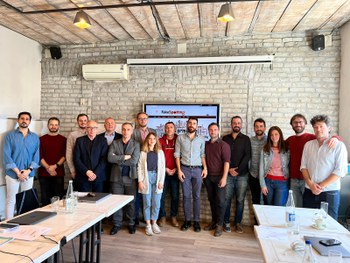
The 4th Fakespotting Transnational Project Meeting was held in Novi Sad (RS) hosted by the partner Novi Sad School of Journalism. All the organisations attended the meeting with two official members, Globsec team attended online.
The main aim of the meeting was the evaluation of the experiences and outcomes from the IO1 and IO4 local pilots implemented so far.
University of Tirana gathered 30 students and 10 academic staff just before the meeting. Over a first session a presentation of the course and modules were made. Participants were asked to register to the platform, which was made possible with the support of Incoma. Over the second session they gave their ideas related to the course and they gave their answers in the Google Form.
Two groups of students were gathered in two days. Staff presented the project, and courses and the aim. UT members gave them 24 hours to finish all the course and follow all content, especially video presentations.
TCFC reported the participation of 12 trainers, educators and education-related professionals from six different organizations in two different geographical areas (Bari and Modena)
The idea was to test the platform by involving two very different geographical areas (one located in central-northern of Italy, the other in southern Italy) so as to test its effectiveness and validity in contexts with different needs and requirements;
Incoma reported the participation of 10 low-skilled adults and 2 adult trainers. Staff introduced disinformation and its main concepts with practical examples Secondly, an overview of the project was presented and then platform’s modules and exercises have been executed.
UMB reported the participation of 30 participants the platform was introduced to a group of professors, who were encouraged to register and provide honest feedback via a Google Form questionnaire and personal feedback after completing the course modules. Two separate groups of 15 students were introduced to the project and courses during a presentation. All students registered on the platform and completed the course within 24 hours, focusing on video presentations and providing valuable feedback through a Google Form questionnaire and personal feedback.
Universidad Loyola was able to gather 39 students and 10 academic members They conducted a classroom training of just over 2 hours, where they outlined the objectives of the project and the online training platform. They explained some key concepts through a presentation to complement the contents of the course modules. In addition, they explored the platform and had the trainees test the various contents and exercises. Finally, the students had time to answer the online evaluation questionnaire.
Just few days before the meeting SEEU (NMK) conducted in a laboratory setting the pilots addressing 32 undergraduates students, 3 PhD students and 8 academic staff. NSSJ members presented the e-platform using their respective devices, desktop computers. The team coordinating the pilot study reached out to the participants' respective professors to provide them with information about the project and the testing process. After the testing was completed, the team sent the evaluation form to the participants via email.
NSSJ (RS) team tested the e-learning on 12 low-skilled adults from 18 to 40 y.o. Testing was organized in groups of two or three participants. Before starting the testing, the participants were explained how the platform works and how to navigate through the modules.
University of Bologna and Globsec illustrated their plans for their forthcoming local pilots.
The Meeting provided the chance to finalise the structure of the Intellectual Output 2 and to provide suggestions and settings for the next Multiplier Event.
Administrative documentation updates and dissemination activities have been monitored.
A final agreement on the preferred time for the Final TPM in Bologna has been agreed.
All the participants received an attendance certificates and evaluated the meeting though related questionnaire.
Fakespotting Joint Staff Training Event - Seville - September 2022
The LTTA was held in Seville (ES) and implemented as a 5-days training. The training involved all experts and HE teachers from each participating organisation for a total number of 21 participants. The activity goal was to let teachers and educators gain the technical competences and information to deliver the digital assessment tool and the web based learning pilot version to their learners (O1_A4; O4_A4). IO1 and IO4 pilot version was digitally set up by Incoma beforehand in order to let participants evaluate the first development of contents and digital exercises.
The training is also required to collect the mandatory participants feedbacks in order to assess the transferability of the tools into HEIs’ and Adults’ learning environment. Pagella Politica, Globsec, Incoma and NSSJ trained HE teachers for 2 days providing skills and competences on how to spot fake news delivering the following contents: - Identify and discuss search engine.
- Explore methods of using search tools more effectively to locate appropriate sources.
- Perform web searches using different ‘operators’ and advanced search options.
- Discuss the benefits of using a wide range of online sources for researching subjects.
- Demonstrate effective use of multiple sources to contribute information in a collaborative environment.
- Assess the quality and appropriateness of information found online to help determine its validity and contribute an example to the discussion.
- Identify sources which need to be up-to-date and relevant in order to be of use when researching.
- Explore an information journey and produce a timeline relating to a topic of your choice.
- Assess the competences gained;
- Online tools to spot online disinformation;
Matej Bela University, UniLoyola, University of Bologna, SEEU and UniTirana staff trained the teachers and educators for 2 days providing skills and e-competences on web based learning delivering the following contents: - Media today; - How can media be manipulated; - Impact of disinformation; - Case studies. - Semiotics, Journalism, Media Literacy and regulations, Political Science and Communication subjects to be integrated into the web based learning. During the final days University of Bologna and Incoma (in charge for IO1 and IO4):
- Delivered technical inputs to make teachers able to explain to and
implement with their learners the Outputs pilot versions;
- led the assessments of the Outputs pilot versions through appropriate questionnaires and moderating oral discussion with participants in order to evaluate all the features related to local transferability.
- Delivered the questionnaires that will be exploited by teachers and educators to collect feedbacks from the students and adults after the IO1 and IO4 pilot versions delivering (O1_A4) (O4_A4)
At the end of the training the following results has been reached:
- Participants updated their digital skills in Information Literacy; Media Literacy and fact-checking.
- Participants acquired digital tools in order to enhance professional engagement, innovative teaching methodologies to interact with their students, empowering learners facilitating their digital competences.
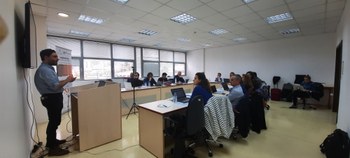
The third transnational project meeting was held in Tetovo (NMK) between 30th March and 1st April, hosted by the project partner South East European University. The meeting has been attended by all the partner organisations live except University Matej Bel which had to deal with a strict internal Covid-19 regulation. 20 participants in total.
The core-business of the 3rd meeting was collectively witness the passage from the finalisation of the IO1 web-based learning modules to IO4 self-assessment tool. The second aim of the meeting was the verification of the finalisation of the second part of the IO3 Guideline, the one related to the disinformation national case-studies. The 2 main objectives has been achieved with success.
The finalisation of the IO1 modules has been achieved by all the partner organisations which dedicated their effort on a single module development:
- 1: A new information space: Unibo
- 2: Social Media VS Regular Media: Loyola
- 3: Types of manipulation: Tirana
- 4: Lateral reading: Unibo
- 5: Identification of false contents: Matej Bela
- 6: Impacts of disinformation: SEEU
In order to standardise a unique format for all, each organisation prepared a written text on the topic (about 12 minutes each) and a related PPT or Canva document in order to provide also a visual identity to the arguments developed turning it . In this way the effort of contents transfer into the online platform that will host the e-Learning should be eased by the simultaneous supply of written and visual contents.
Incoma staff in charge for the platform realisation confirmed the matching between the formats and contents provision with the platform layout.
Concerning the IO4, each organisation – according to the module they are in charge for – presented a first scheme and set of exercises for the self-assessment tool.
The options provided a wide range of education formats, from simulations (like for search engines deep enquiry, lateral reading), quiz formats to question photos and videos, practice of technical tools to test the reliability of digital items, call to direct action from the user to help the system to figure out the digital sources (and their trustfulness) through educational paths.
Still, the next phase of technical set up has been confirmed by the partner in charge. The works of platform development (already started months ago) will lead to the first ENG version of IO1 and IO4 over the Joint Staff Training Event in Seville (over the meeting has been evaluated September as the best suitable timing and in line with the project application).
The verification of IO3 case-studies provided the chance for a wonderful accidental cultural exchange among the partners:
SEEU (NMK): presented a wide overview of the different narratives that came along with the changing country's name referendum and the related disinformation campaigns.
U. Tirana (AL): presented the phenomenon of disinformation over the youngest generations, a deep and radicated phenomenon in the country and a preferential channel for disinformation.
U. Loyola (ES): presented the disinformation strategies, narrations, photos and marketing materials exploited over the Catalonian referendum.
Pagella Politica (IT): Ballot sheets – disinformation case during the 2018 Italy general elections.
Globsec (SK): presented the information dynamics spread and radicalised from and around the case of Ian Kuciak that shed a shadow on the relationship between government, mafia and European funds exploitations.
NSSJ (RS): presented the hot and harsh propaganda/disinformation conducted against the mobility and stay of migrants in the country.
Also the work on IO2, temporarily stopped - as foreseen by application in order to give priority to IO1-IO4 and ensure the next local pilots’ implementation – has been enriched by digital information literacy exercises to be reported as tips for higher and adult educators. The reporting will be included in the second part of the Toolkit.
All the administrative efforts have been collectively verified and reported over this Interim Report.
The meeting end up with and evaluation questionnaire which confirmed the satisfaction of Outputs’ progress development as well as the clarity of next phases, the collaboration among partners and the external communication. All the deadlines (outputs, activities, dissemination, administration) have been highlighted through the collective completion of an action plan at partnership level from April to September 2022 (Joint Staff Training Event).
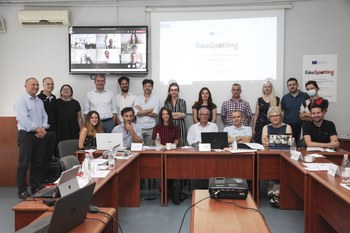
The Second Transnational Project Meeting was attended by the organisations belonging to the partnership in order to update and coordinate the project’s activities and products carried out so far.
Due to Covid-19 situation and the explicit bans delivered by some European nations concerning flights towards and from non-European countries, some partners could not had the possibility to attend the meeting in person in Tirana (AL). The majority of organisations were able to reach the meeting venue and 3 partners joined virtually, turning the meeting in a blended modality and keeping the quality foreseen by the application and the objectives’ achievements. 24 participants in total.
The main aim of the meeting was the mutual presentation among partners of the works carried out so far.
The web based learning and the digital assessment tool is an OERs for higher education institutions and adult education in order to deploy and delivery innovative and updated digital information and media literacy resources.
Over the meeting Pagella Politica, NSSJ and Globsec have been showing the work done over the first 8 months of the project deploying a clear framework of the web-based learning structuring the work in 6 learning modules:
M1: New Information Space
M2: Social vs Regular media
M3: Types of manipulation
M4: Lateral Reading
M5: Identification of false contents
M6: Impacts of disinformation
Each module present the same structure: synopsis, aims, learning outcomes, introduction, description, further readings, exercises (that will be part of IO4).
The development of the Outputs will be taken in charge by Universities which will provide a first draft over the 3rd TPM and then a technical finalisation on September 2022 during the LTTA.
A virtual coordination meeting will be held in September 2021 in order to assign one Module per University (2 for the Coordinator).
The first outcome of theToolkit IO2 has been achieved. A questionnaire format to collect digital labour market needs was achieved by Incoma, together with SEEU and University of Tirana. A list of respondents/stakeholders was drafted by each partner in order to create a respondents box the survey was shipped to (in 6 local languages) thanks to the technical support of Loyola University.
The numbers obtained had altogether overcome the expectations and the qualitative answers confirmed the need for innovative training in the field of disinformation according to the shortages reported in formal education and employment services.
The results will drive the elaboration of the Toolkit, both the theoretical and the training part.
A first set of researches and analysis belonging to the work in “The Guideline on Media and Information Literacy IO3” was realised and presented over the meeting by University of Bologna, University Matej Bel and Universidad Loyola and shared over the meeting.
The work of University of Tirana and SEEU, formerly committed in IO2, will be carried out providing insights on the relationship between former education at different levels and the problem of disinformation.
University of Bologna provided the Dissemination & Exploitation Plan in order to lead the partnership in implementing, collecting and properly promoting project aims, activities and outcomes. According to the previous assignment of dissemination responsibilities among partners (see Kick-off) the following dissemination results have been achieved: Official project Website realisation, Official project Logo, Official project Facebook Account, Official project Instagram Account, Official project Twitter Account, Official e-Newsletter Template, Official project leaflet and brochure
Website and official social networks accounts are constantly updated by organisations in charge.
The official templates to report the online posts and the offline events exploited to promote the Fakespotting project will be filled out by each partner by 30th September 2021 in accordance with the Progress Report deadline.
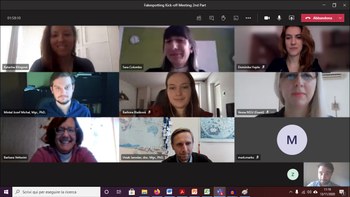
The kick-off meeting was held over 12th/13th/19th November 2020 on virtual platform due to Covid-19 situation. The event provided the chance to deliver an overview of the project starting from a reflection on the European Union efforts on tackling fake news from 2015 on, the digital education framework for Citizens and Educators established by the Commission as well as the Digital Education Plan, the gender divide and the mismatch between digital skills in Europe, the labour market needs and how such lacks will lead and shape the Fakespotting outputs.
The presentation took into account also the aims, the preparatory activities, the documentations and the operative actions to properly deliver the project activities, the trainings and the promotional ventures.
Particular attention was reserved to the configuration of the Joint Staff Training Event as fundamental moment for the Fakespotting project.
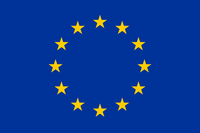
The European Commission's support for the production of this publication does not constitute an endorsement of the contents, which reflect the views only of the authors, and the Commission cannot be held responsible for any use which may be made of the information contained therein.